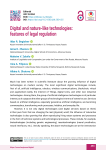Государство и право. Юридические науки. Рубрика в журнале - Journal of Digital Technologies and Law
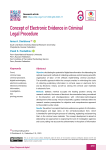
Concept of Electronic Evidence in Criminal Legal Procedure
Статья научная
Objective: elucidating the potential of digital transformation for elaborating the optimal means and methods of collecting evidences and introducing scientific organization of labor of the officials implementing criminal procedure. The scientific approach within the concept consists in minimizing the costs of collecting evidentiary information in criminal cases in electronic form and by electronic means, as well as storing the criminal case materials in electronic form. Methods: dialectic method occupies the leading position among the research methods, the issues of electronic documentation being considered in the interaction and interdependence with information-technological development of the society. The set of scientific cognition methods within the research creates prerequisites for objective and comprehensive approach to the problems under study. Results: the authors’ concept of electronic evidence is a system of information-technological and legal views on the criminal-procedural form, which is intended for optimizing the process of collecting, registering and preserving them in the criminal case materials. The concept development is aimed at elaborating new approaches to organizing the work of investigation agencies and courts, taking into account the achievements in the sphere of information technologies, providing new techniques of collecting criminal-relevant, criminal-procedural, criminological significant information when investigating and hearing of a criminal case. The proposed concept is also aimed at improving interaction and in-service communication of the officials of the preliminary investigation bodies with the officials of information-technological systems for the purposes of collecting evidentiary information in electronic form. Scientific novelty: the changes were systemically analyzed, which are taking place in the contemporary information society, through the prism of the emerging problems between the sectoral criminal-procedural evidentiary law and more modern technological means of collecting evidentiary information. The article demonstrates a new approach to creating technological interaction using digital technologies, on the scientific base of organization of proving activity, intended to optimize and rationalize the process of proving in criminal procedure. Practical significance: the research materials can be used to prepare proposals on making changes and additions in the current legislation with a view of implementing the practice of already functioning models of criminal-procedural activity of foreign countries, an inexhaustible potential of information-technologies, software, and artificial intelligence to rationalize proving in criminal cases.
Бесплатно
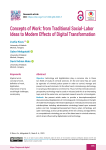
Concepts of Work: from Traditional Social-Labor Ideas to Modern Effects of Digital Transformation
Статья научная
Objective: technology and digitalization play a converse role in these two fields of study of criminal sciences. On the one hand, they are used by agencies of criminal justice system in order to control, manage and prevent crime and criminals. On the other hand, criminals enjoy technology in carrying out their plans to commit crime. Thus, from the criminal sciences’ perspective, technology may be used or misused, and this is an interesting topic, and at the same time, an important research area for criminologists. Methods: the present article seeks to provide a descriptive-analytical discussion about digitalization of criminology and criminal justice in the light of modern technologies, internet and cyberspace. It introduces new areas and sub-disciplines including administrative criminology based upon actuarial justice and risk management/assessment theory, cyber criminology and cyber victimology, as two sub-disciplines of the new century, and algorithmic or computational criminology, as one of the latest area in criminal sciences, which all are influenced by digitalization and technology. Results: authors concluded that due to the digitalization atypical work emerges but legislator defines the scope of work regulated by law and that makes atypical work relationship becomes a typical work relationship. At the same time some areas fall into the gray zone. To fix that legislator should provide an interpretation that will not become empty in a year or two due to technological changes. Scientific novelty: the applicability of technology and digitalization in criminology and criminal justice has widely increased and developed, specifically since the beginning of the third millennium. Practical significance: digitalization and Technology has become increasingly important to criminology and criminal justice at both the theory and practice within the sphere of social and criminal sciences. The nature and types of crime and criminals, and also the methods and mechanisms of control and preventing them in the light of requirements of criminal policy and criminal justice are highly dependent upon technology and digitalization.
Бесплатно
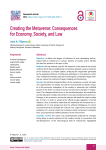
Creating the metaverse: consequences for economy, society, and law
Статья научная
Objective: to define the degree of influence of such developing technological field as metaverse on various spheres of society and to identify the need for reaction on the part of law. Methods: the key method used for the research is the systemic-structural method, which allows establishing connections between various elements of the society as a complex system, analyzing the regularities generated by the spreading influence of metaverse prototypes in one sphere on other ones. Additional methods used are formal-logical, comparative-legal methods, as well as the methods of legal modeling and forecasting. Results: the practical implementation of the metaverse concept will open new opportunities for people, but will be accompanied by drastic changes in the economic subsystem of the society, in particular, the multifold growth of the share of virtual economy and structural changes in employment. The changes will also occur in the social subsystem: the social links and the education models will transform, new personal demands will occur. Changes in the economic and social spheres will entail the need to adapt law to them, in order to preserve the effective legal regulation of social relations. Also, it should be noted that the metaverse will increase the capabilities of not only people but also the artificial intelligence, for which virtual environment is actually the “natural” one. Legal norms must provide protection of a human under the increased virtual component in people’s lives, accompanied by intellectualization of the environment. Scientific novelty: the author has systematically analyzed the changes taking place in various spheres of the modern society in connection with the development of the technological field of metaverses; highlighted the key issues arising due to the said development and requiring legal solution both at the constitutional level and at the level of sector legislation; and proposed the necessary changes in legal regulation. Practical significance: the research materials can be used when preparing proposals on changes and amendments in the current legislation, as well as in pedagogical activity, in particular, for implementation of educational courses or modules related to law under digital transformation of the society.
Бесплатно
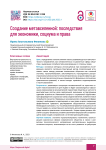
Cоздание метавселенной: последствия для экономики, социума и права
Статья
Цель: определение степени влияния такого развивающегося технологического направления, как метавселенные, на различные сферы общества и выявление потребностей в реагировании со стороны права. Методы: основным методом, используемым при проведении исследования, является системно-структурный метод, позволяющий установить связи между разными элементами общества как сложной системы, проанализировать закономерности, порождаемые распространением влияния прототипов метавселенных в одной сфере на другие. В качестве дополнительных применяются формально-логические, сравнительно-правовой, а также методы правового моделирования и прогнозирования. Результаты: реализация концепции метавселенной на практике откроет новые возможности для людей, но будет сопровождаться серьезными изменениями в экономической подсистеме общества, в частности многократным ростом доли виртуальной экономики и структурными сдвигами в занятости. Изменения коснутся и социальной подсистемы: трансформируются социальные связи, модели обучения, появятся новые потребности личности. Перемены в экономической и социальной сферах повлекут необходимость адаптировать к ним право в целях сохранения эффективности правового регулирования общественных отношений. Необходимо учитывать и то, что метавселенная увеличит возможности не только людей, но и искусственного интеллекта, для которого виртуальная среда является практически «естественной». Нормы права должны обеспечить защиту человека в условиях увеличения виртуальной составляющей в жизни людей, сопряженной с интеллектуализацией среды. Научная новизна: системно проанализированы изменения, происходящие в различных сферах современного общества в связи с развитием технологического направления метавселенных, выделены основные вопросы, возникающие из-за этого развития и требующие правовых решений как на уровне конституции, так и на уровне отраслевого законодательства, предложены необходимые изменения в правовом регулировании. Практическая значимость: материалы исследования могут быть использованы в работе по подготовке предложений о внесении изменений и дополнений в действующее законодательство, а также в педагогической деятельности, в частности, при реализации учебных курсов или модулей, связанных с правом, в условиях цифровой трансформации общества.
Бесплатно
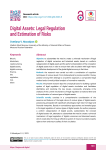
Digital Assets: Legal Regulation and Estimation of Risks
Статья научная
Objective: to substantiate the need to create a universal mechanism of legal regulation of digital currencies and tokenized assets, based on a uniform categorization of digital assets and the author’s interpretation of the conception of digital assets risk, in order to ensure their safe circulation with legal means and effective development of the global digital economy in the future. Methods: the research was carried out with a combination of cognition techniques of various levels: from philosophical to private scientific; the key position among them belongs to a systemic approach, a comparative legal method and a formal-juridical analysis of normative materials. Results: the present research lays the conceptual basis for building a global system of legal regulation of digital assets circulation and facilitates identifying and resolving the key issues, necessarily emerging in the analysis of the current mechanisms of legal regulation at national level and in the estimation of various types of digital assets. Scientific novelty: consists in a comprehensive consideration of the essence and features of the legal nature of various types of digital assets, possessing, alongside with significant advantages, high risks from legal and financial viewpoints. Based on contradictory approaches and revealed gaps in the legal regulation of various types of digital assets, the author proposes a uniform categorization of digital assets, substantiates the concept of digital assets risk, attempts to substantiate the need to create a universal mechanism of legal regulation of digital currencies and tokenized assets, which would allow forming an effective system of means to protect property right to them and ensure safety of their circulation. Practical significance: is due to the current absence of a unified approach and a possibility to apply the existing legal norms in relation to innovative digital assets, taking into account their specificity, despite their trans-border character. The main provision and conclusions of the research can be used to improve the mechanisms of legal regulation of digital assets circulation.
Бесплатно
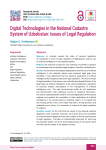
Digital Technologies in the National Cadastre System of Uzbekistan: Issues of Legal Regulation
Статья научная
Objective: to critically analyze the state of national legislation of Uzbekistan in terms of legal regulation of digitalization and the use of artificial intelligence in the cadastral sphere. Methods: the research is based on such methods of scientific cognition as formal-legal and comparative-legal analysis, induction and deduction. Results: the provisions that regulate digitalization and the use of artificial intelligence in the cadastral sphere were analyzed, legal gaps were identified. It was determined that the practical application of artificial intelligence technologies outpaces its legal regulation. The shortcomings of legal regulation in this sphere were noted (lacking legal definition of the legal status of artificial intelligence in the national legislation; regulation of business entities’ participation in the management of artificial intelligence, etc.). The said shortcomings hinder its full application and harmonization with traditional sources of cadastral information. The author substantiated the need for universal digitization of the national cadastre and predicts the possibility of wider application of artificial intelligence in the natural-resource cadastral system. It is argued that the existing system in its current state may lead to wrong decisions and cadastral errors, hence, it is necessary to improve the legal regulation of cadastre. Scientific novelty: for the first time the results of the national cadastre digitization were assessed. Forecasts were given about the possibility of using artificial intelligence in this area, subject to further improvement of legal regulation. The latter is fundamentally important for reforming the cadastral system, since the technological basis of this system does not fully meet the needs of the digital economy. Practical significance: it is due to the lack of legal regulation of the artificial intelligence concept and legal status in the national legislation, as well as a unified approach to the cadastral system digitalization. Modern technologies are actively used in practice, but lack a sufficient legal basis. The main conclusions, proposals and recommendations of the study can be a basis for further improvement of the legal framework of Uzbekistan in terms of the application of artificial intelligence technologies.
Бесплатно
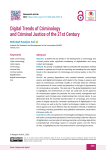
Digital Trends of Criminology and Criminal Justice of the 21st Century
Статья научная
Objective: to define the key trends in the development of criminology and criminal justice under significant broadening of digitalization and using modern technologies. Methods: the priority of analytical method combined with descriptive method provided an optimal set of tools for searching and revealing the main digital trends in the development of criminology and criminal justice in the 21st century. Results: the growing dependence was revealed between criminal-legal science and digital technologies, which leads to the change in essence and types of contemporary criminality, models of criminals’ behavior, methods and mechanism of crime control and prevention in the light of requirements of criminal policy and justice. The dual role of the global digitalization trend is highlighted, the achievements of which are used both by the agencies of criminal justice system (in particular, for crime control, management and prevention) and criminals when implementing their criminal intents. It was determined that the essential transformation of criminology and criminal justice is largely caused by a dramatic development of digitalization in the 21st century, as well as by the modern technologies created on its basis, which appear to be more effective than the standard methods of traditional criminology, including quantitative and qualitative estimations, observation, interviews, polls, etc. Scientific novelty: new spheres of criminal-legal knowledge are introduced, as well as the corresponding disciplines formed exclusively under the influence of digitalization, such as cyber criminology and cyber victimology; algorithmic (computational) criminology, based on actuarial justice and the theory of risks, is highlighted as the most recent trend in criminological science. Practical significance: the account of trends and positive experience gained in the sphere of digitalization determines the successful solution of the tasks associated with crime counteraction, transformation of approaches to the content, goals and methodology of applied criminology and criminal justice. The global megatrend of digitalization essentially changes the appearance of the criminal-legal science, sets the new theoretical and applied directions of its development. Timely upgrade and adaptation of knowledge, skills and capabilities in compliance with the achievements of digitalization will allow criminology and criminal justice to correspond to the tasks of the new millennium.
Бесплатно
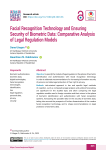
Статья научная
Objective: to specify the models of legal regulation in the sphere of biometric identification and authentication with facial recognition technology in order to elaborate recommendations for increasing information security of persons and state-legal protection of their right to privacy. Methods: risk-oriented approach in law and specific legal methods of cognition, such as comparative-legal analysis and juridical forecasting, are significant for the studied topic and allow comparing the legal regulation models used in foreign countries and their unions in the sphere of biometric identification and authentication with facial recognition systems, forecasting the possible risks for the security of biometric data, taking into account the prospects of further dissemination of the modern facial recognition technology, and to shape recommendations on legal protection of biometric data. Results: the ways are proposed to further improve legislation of the Republic of Kazakhstan and other countries currently developing the legal regulation of biometric data, regarding the admissible criteria for using the facial recognition technology, the elaboration of categorization of biometric systems with a high and low risk levels (by the example of the experience of artificial intelligence regulation in the European Union), and the necessity to introduce a system of prohibitions of mass and unselective surveillance of humans with video surveillance systems, etc. Scientific novelty: consists in identifying a positive advanced foreign experience of developing legal regulation in the sphere of facial recognition based on biometry (European Union, the United States of America, the United Kingdom of Great Britain and Northern Ireland), which can be used for further improvement of the national legislation in order to create more effective mechanisms of legal protection of personal data, including biometric information. Practical significance: based on risk-oriented approach and comparative analysis, the research allows elaborating measures for enhancing the legal protection of biometric data and ensuring effective protection of civil rights and freedoms by forecasting further expansion of the modern facial recognition technology.
Бесплатно
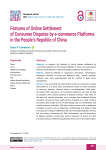
Статья научная
Objective: to research the features of online dispute settlement by e-commerce platforms in the People’s Republic of China, to reveal positive features and drawbacks of ODS technologies applied by the platforms. Methods: empirical methods of comparison, description, interpretation; theoretical methods of formal and dialectical logic. Specific scientific methods were used: legal-dogmatic and the method of legal norms interpretation. Results: it was found that the internal ODS model on e-commerce Taobao ODS platforms is a direct, clear and effective means of online resolution of consumer disputes. However, being a non-independent “third party”, the internal ODS mechanism of e-commerce platforms will never be able to substitute other external systems of dispute resolution. ODS relies on the data and Internet processes much stronger than traditional dispute resolution. Among the many safety factors emerging as a result of online processes, ODS creates the risk of data leakage, lack of confidentiality and unsafe consumer protection. ODS also causes concerns due to traditional principles of justice such as objectivity, confidentiality and safety of data in the process of dispute settlement. Not only the People’s Republic of China but any country introducing the ODS technologies into the procedures of dispute resolution should take serious measures to ensure the ODS processes are just, unbiased and guarantee observance of procedural rights. Scientific novelty: consists in a complex research of online dispute settlement by e-commerce platforms in the People’s Republic of China, the practice of implementation thereof has its specific features stemming from the model of self-regulation of thee relations, further stipulated by normative legal acts of the People’s Republic of China and reflected in the activity of private ODS platforms. Practical significance: is due to the current absence of possibility to apply the legal norms and rules, taking into account the specific features of ODS technologies on private platforms, to the relations using such technologies. The main provisions and conclusions of the research can be used to improve the mechanisms of legal regulation of ODS technologies in the procedural legislation of the Russian Federation.
Бесплатно
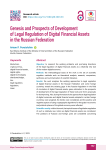
Статья научная
Objective: to research the existing problems and promising directions of the legal regulation of digital financial assets as a relatively new tool of the modern digital economy. Methods: the methodological basis of the work is the set of scientific cognition methods such as theoretical analysis, research, comparison, synthesis, and summarization of scientific literature. Results: the work analyzes the existing approaches to legal regulation of digital financial assets in the Russian Federation and some foreign countries, reveals the existing gaps in the Russian legislation in the field of circulation of digital financial assets, gives estimation to the prospects of development of the legal regulation of these tools and forms proposals for its improving. Also, during the research, the approaches to legal regulation of digital currencies and digital financial assets, adopted in certain foreign countries, were analyzed, the trends were considered, and the positive and negative aspects of using cryptographic algorithms for the goals in economic and juridical spheres of the global economy were reflected. Scientific novelty: within the work, the topical issues of legislative regulation of such a relatively new notion as digital financial assets are considered. The positions of Russian and foreign jurist are considered concerning the existing problems and risks associated with “tokenization” and “blockachainization” of private law. Besides, the author comes to a conclusion about the existence of significant gaps in the current approach to legal regulation of digital financial assets, indicates them and proposes certain mechanisms to solve these problems. Practical significance: is due to the imperfect current legislation in the sphere of relations occurring when using the technologies based of distributed ledger, including digital financial assets. Research of these problems allows evaluating the risks, considering the existing ways of overcoming and solving the emerging disputable questions. Also, the conclusions obtained can be used to improve the Russian legislation, as well as in the academic literature devoted to the topical issues of developing the digital legislation.
Бесплатно
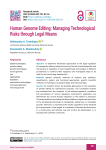
Human Genome Editing: Managing Technological Risks through Legal Means
Статья научная
Objective: to determine theoretical approaches to the legal regulation of reprogenetic editing, taking into account the risk-oriented approach and the practice of regulation of such breakthrough technologies in different jurisdictions; to outline further regulatory and managerial steps to be taken for the technology development. Methods: general scientific methods of analysis and synthesis, classification, system and functional approaches; specific scientific methods: formal-legal, comparative-legal, and historical-legal. Results: the research shows the possible approaches to the regulation of genetic editing for reproductive purposes. The considered variants are evaluated from the viewpoint of risk-oriented approach; conditions and peculiarities of various regulatory mechanisms’ application are determined; the current Russian regulation in this sphere is assessed. The analysis allows concluding that the prohibition or significant restriction of the developing technology of reprogenetic editing has no irrefutable grounds. Moreover, it may lead to the results opposite to those declared by its proponents. In this regard, it is necessary to develop the discussion in a constructive and iterative way and involve all stakeholders in it, including the scientific community. Scientific novelty: the international practice of legal regulation of reprogenetic technologies within different jurisdictions was generalized and conceptually interpreted; the natural scientific arguments in assessing the implemented regulation effectiveness were analyzed. This not only allows systematically considering the current and hypothetical risks of genetic technologies’ development and use, but also provides an opportunity to use a risk-oriented approach to the analysis of legal regulation of genome editing technologies. The next step in comprehending the phenomenon of genetic editing becomes possible. Practical significance: the study results can be used for building further constructive dialog on applying legal mechanisms to human genome editing. The study can also be a basis for iterative approach in the future discussion.
Бесплатно
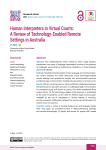
Human Interpreters in Virtual Courts: A Review of Technology-Enabled Remote Settings in Australia
Статья научная
Objective: This interdisciplinary review intends to inform legal scholars, practitioners, and users of language interpretation services in the judiciary of challenges encountered by professional interpreters in virtual hearings and remote settings. Methods: Situated at the intersection of law, language, and communication, this review analyses the latest discourses about technology-enabled remote settings and synthesises insights into recommended practices in effective legal communication mediated by interpreters in virtual courts. Results: With an overarching aim to improve effective collaboration between interpreting service providers and users in multilingual legal communication for procedural equity and access to justice, this review establishes three central claims: (1) the technology-enabled virtual hearings is accelerated by the covid-19 pandemic, (2) the need for effective legal communication mediated by the use of interpreters in remote settings is mounting, and (3) successful collaboration between the service user and provider can achieve a win-win outcome. Scientific novelty: A review of existing studies in law and language reveals three main gaps: (1) procedural justice in videoconferencing hearings and remote technologies, (2) equity and access for people with limited proficiency in the official language of the court system, and (3) effective legal communication mediated by human interpreters in virtual courts. This review bridges the existing gaps in knowledge. Practical significance: it touches on three aspects of the law-language nexus: (1) Covid-19 accelerated adoption of the virtual courtroom technologies in Australia and its impact on court interpreting, (2) challenges for interpreters in remote settings, and (3) achieving linguistic accuracy and intercultural appropriateness when preserving the manner in which the content is expressed as intended or implied by the original speaker. Grounded in courtroom interpreting practices, it highlights the importance of effective collaboration in successful multilingual legal communication rooted in mutual purpose, shared expectations, and interprofessional understanding.
Бесплатно
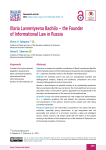
Illaria Lavrentyevna Bachilo – the Founder of Informational Law in Russia
Статья научная
Objective: to assess the scientific contribution of Illaria Lavrentyevna Bachilo into forming the science of informational law in Russia; the role and significance of I. L. Bachilo’s scientific works for the Russian informational law. Methods: the methods used in the work are: retrospective scientific and bibliographical analysis, analysis and synthesis, comparison and cross checking, bibliographical study of documents. Results: a brief analysis of scientific activity of an outstanding researcher Illaria Lavrentyevna Bachilo was carried out; the most significant works were described, which, in the authors’ opinion, appeared to be fundamental in the formation and development of the science of informational law. Scientific novelty: the article presents the main stages and achievements of I. L. Bachilo’s academic life and reflects the personal estimations and impressions of the authors, formed during mutual work with Illaria Lavrentyevna Bachilo. Practical significance: the information presented in the article will allow scientists, especially young researchers, to get acquainted with the personality and activity of a prominent scientist, a deep and intelligent person, whose memory will always dwell with the hearts of the people working in the Section of Informational Law of the Institute of State and Law of the Russian Academy of Sciences.
Бесплатно
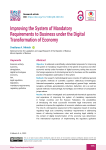
Статья научная
Objective: to elaborate scientifically substantiated proposals for improving the system of mandatory requirements in the sphere of business and other economic activity under formation of digital economy, taking into account the foreign experience of eliminating barriers for business and the available practice of legislation optimization in this sphere. Methods: the research methodological basis consists of traditional general and specific methods of scientific cognition: dialectical, formal-logical, historical-comparative, systematic, terminological, general logic methods (analysis, synthesis, generalization, induction, deduction, etc.), as well as special methods: historical-legal, formal-legal, and method of comparative jurisprudence. Results: the author investigated and systematized theoretical approaches and experience of improving the system of mandatory requirements in foreign countries and the Russian Federation; the possibilities of introducing the most successful innovative legal instruments and practices to improve the regulation of economic relations were considered. The role of a retrospective assessment of the regulatory impact of existing regulatory legal acts containing mandatory requirements in addressing issues of reducing burdensome rules and ensuring legal stability in the context of digital transformation of the economy was determined. The international experience of implementing the regulatory guillotine mechanism was considered; its essence, purpose, tasks, basic principles, and algorithm of operation were revealed. The issues of establishing and evaluating the application of the requirements for business contained in regulatory legal acts were analyzed. Scientific novelty: the author’s comprehensive analysis of existing scientific developments on improving the system of mandatory requirements for business; systematization of scientific and theoretical approaches to the selection of innovative legal instruments to eliminate excessive legal regulation of economic relations; generalization of successful foreign practices in the implementation of “regulatory guillotine” measures. Practical significance: recommendations were developed for effective reduction of burdensome requirements that negatively affect the development of business in the context of digital transformation of the economy. Conditions were determined for the implementation of a full-fledged regulatory impact assessment procedure and the successful implementation of regulatory reforms. The results of the study can be used in standard-setting activities and in the educational process when elaborating educational programs in Economics and Law.
Бесплатно
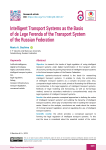
Статья научная
Objective: to research the trends of legal regulation of using intelligent transport systems under digital transformation of the transport sector of economy, namely, the growing importance of intelligent transport systems in the future transport system of the Russian Federation. Methods: systemic-structural method is the basis for researching intelligent transport systems. It enables to study the architecture of intelligent transport systems as a complex structural unity. Also, comparative-legal method was used, aimed at illustrating the differences and similarities in the legal regulation of intelligent transport systems. Methods of legal modeling and forecasting, as well as formal-logic method, served as secondary methods to comprehensively study the legal regulation of intelligent transport systems. Results: the article presents conceptual approaches to defining the notion of “intelligent transport systems” and outlining the hierarchy of intelligent transport systems, which play a fundamental role in building the transport sector. Based on the analysis, conclusions are made about the vectors of forming transport legislation, aimed at regulating the use of intelligent transport systems. Scientific novelty: the article provides a conceptual approach to forming the legal regulation of intelligent transport systems. To this end, the issue is considered about the essential content of the notion of “intelligent transport systems” at legal and scientific levels; the current terminological problems in building the legal regulation are shown. Analysis of the architecture of intelligent transport systems allowed for the first time to formulate the basic approaches to shaping the legal regulation of its individual elements (including highly automated and fully automated transport means, “smart” infrastructure, etc.) not in isolation but as constituent parts of the whole matter. Practical significance: the presented materials and conclusions facilitate the development of legal regulation of transport industry under digital transformation. The article accentuates the legal regulation of intelligent transport systems taking into account their technical and technological features. It is the intelligent transport systems that are de lege ferenda of the transport system, which determines the vector of transformation of transport legislation. In turn, development of the legal bases allows broadening the geography of introducing technical novelties and making their application much more large-scale.
Бесплатно
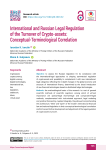
Статья научная
Objective: to assess the Russian legislation for its compliance with the international-legal approaches to shaping symmetrical regulation of crypto-assets and possibility to complement it with new international-legal categories reflecting the in-depth changes in the global economy and structure of international finance, determined by the broad introduction of new financial technologies based on distributed ledger technologies. Methods: the methodological basis of the research is a set of general scientific methods of scientific cognition, among which of utmost importance are special-legal (formal-legal and comparative-legal) methods, complemented with risk-oriented approach, legal modeling and juridical forecasting. Applied integrally, they allowed comprehending the architecture, “letter and “spirit” of the modern international financial law and national legislation in their conceptual-terminological correlation and to forecast further development and adjustment of the legal regulation of crypto-assets turnover. Results: it was found that there appears a stable trend in the crypto-assets turnover regulation, according to which “soft” law dominates among the law sources (this is especially notable in the sphere of international financial law compared, for example, with conventions or international treaties); at the same time, there is a strengthening trend of “fragmentation” of international law with regard to crypto-assets turnover; the authors mark inconsistency of the conceptual framework contained in international acts and in the Russian legislation, as well as the gaps in the regime of crypto-assets turnover at the level of national law; the trends and forecasts are presented referring to the development of international-legal regulation of the sphere of crypto-assets. Scientific novelty: consists, first of all, in a complex comparison, based on, among other aspects, the fundamentally new concepts of regulation of such progressive international-legal categories as cryptoasset, virtual asset, cryptocurrency, stablecoin, etc., some of them rarely used in the Russian legal discourse and actually never applied in legislation. Practical significance: the scientifically grounded proposals are formulated, aimed at improving the conceptual-terminological framework of the Russian legislation in the sphere of crypto-assets turnover, implementation of which will allow constructing a common legal space with the technologically most advanced states, will help to improve investment climate and financial attraction of the state; will improve the national-legal regime of crypto-assets turnover from the viewpoint of not only actual market demands, but also state security interests and improving competitiveness of the Russian legislation.
Бесплатно
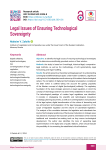
Legal Issues of Ensuring Technological Sovereignty
Статья научная
Objective: to identify the legal issues of ensuring technological sovereignty and to determine scientifically grounded vectors of their solution. Methods: the study is based on formal-legal, historical-legal, comparative-legal methods, as well as the methodology of soft systematicity, legal forecasting, and legal modeling. Results: the article presents a theoretical and legal approach to understanding sovereignty and differentiating its types. Under modern conditions, a significant role is given to the independence and autonomy of the state in the technological sphere. The correlation of digital and technological sovereignty is considered; the latter notion is outlined taking into account the gaining popularity of the Western concept of digital (technological) solidarity. The regulatory foundation of the state strategic autonomy is legal regulation, in which the concept of technology-centrism has been firmly established in recent years. The technological paradigm of modern legal regulations was identified. It consists in strategizing the scientific and technological innovations in strategic planning documents, as well as in sovereignization and cyclization of the legal sphere, digital transformation of the culture of lawmaking and law enforcement, technologization of the legal language, expansion of the scope of legislative regulation and the volume of subordinate legislation. The analysis of the correlation between the legislative and subordinate law levels of technological positioning of the Russian Federation in strategic areas has allowed to emphasize the important systemic interrelation of the involved traditional and innovative law-making tools as they ensure technological development. The author also identifies the risks of expanding legal experimentation in the digital area of public relations, which should exclude the possibility of circumventing the established critical limitations. Scientific novelty: the work forms a theoretical and legal model of ensuring technological sovereignty, which is of strategic importance for the preservation of the Russian Federation sovereignty in its classical understanding as the main and most important feature of the state. Practical significance: the results can be used in law-making activities of public authorities to create legal mechanisms for research, development and implementation of critical and end-to-end technologies and the production of high-tech products based on them in order to ensure national security of the Russian Federation.
Бесплатно
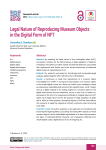
Legal Nature of Reproducing Museum Objects in the Digital Form of NFT
Статья научная
Objective: by revealing the legal nature of the nonfungible token (NFT), to propose a solution for the topical issues of legal regulation of relations emerging in the sphere of online market and Internet platforms, associated with reproduction and further use in the virtual environment of tokenized digital copies of original pieces of art. Methods: the research was based on formal-legal and comparative-legal analysis, applied together with methods of law interpretation. Results: a conclusion is made that reproduction of a museum object in the digital form of NFT is not equal to reproduction of a museum object in the simple digital format, as it does not contain such mandatory criteria as uniqueness, indivisibility and scarcity of the specific token. An NFT object acts as a digital original of an analog original of a museum object in the digital environment and the metaverse, not as a new form of media art. Expressed in the form of a uniqueness certificate of a digital object, an NFT object, by its legal nature and for the purpose of legal regulation of deals with it, refers to “other property” among the objects of civil law, which allows the museums to apply the respective contract constructs when structuring such deals. Scientific novelty: the author proposes a new approach to considering and improving the legal regulation, accounting and storing NFT objects as virtual museum objects, the so-called digital equivalents of an item, which possess the signs of individual-definite character and uniqueness, differing from simple digital copies, digital pieces of art, 3D mapping, etc. Practical significance: the research results can be used for improving legal regulation of museum activity, correcting the civil and museum legislation, in particular, for defining virtual museum objects; for implementation of law, for example, when signing deals on using and selling NFT objects, in terms of specifying the content and volume of authorities of the right holders of the nonfungible token.
Бесплатно
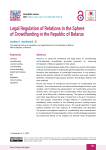
Legal Regulation of Relations in the Sphere of Crowdfunding in the Republic of Belarus
Статья научная
Objective: to study the theoretical and legal bases of crowdfunding and to elaborate scientifically grounded proposals for improving the Republic of Belarus legislation in this sphere. Methods: the methodological basis of the research is a system of principles, methods and techniques of studying the general regularities of emergence, formation and development of social-legal phenomena. In the research, general and specific methods of scientific cognition were used: analysis, synthesis, comparative-legal, logical, systemic, formal-legal, dialectic and other methods. Results: the history of emergence and formation of crowdfunding was analyzed. The social-economic and technical-technological factors were revealed, which facilitate the popularization of crowdfunding among the Internet users. The origins of the “crowdfunding” notion were discussed, as well as its filling with a definite meaning. The types of crowdfunding were listed, depending on the goal of investment on the part of investors. The main subject composition of legal relations in crowdfunding was established, which consists of the following persons: funding seeker; funder; operator of online-funding service. The overall algorithm of legal relations between the main subjects of crowdfunding was described. The positive and negative aspects of crowdfunding were characterized. An overall analysis of foreign legislation in the crowdfunding legal regulation was performed. Based on the analysis, the general trends of legislation development were presented. The program and normative legal acts on developing crowdfunding in the Republic of Belarus were reviewed. The probable contract models of the parties’ legal relations registering were named. The technical and legal requirements to the functional of an online-funding service were determined. The minimal necessary set of measures was proposed, which may prevent risks and threats associated with procurement and extension of funds through online-funding services. Based on the operator functions, specific requirements to the rules of online-funding service were determined. Scientific novelty: the author comprehensively studied the notion, legal nature and features of legal regulation of crowdfunding. The factors were revealed, which influence the formation of the legal norms regulating the procurement and extension of funds through online-funding services. The author elaborated proposals for improving the Republic of Belarus legislation in the sphere of social relations under study. Practical significance: the research results are significant for developing the studies in the sphere of civil, economic, and informational law. The obtained results may be used in teaching a course in civil, economic, and informational law, as well as be applied by law subjects when elaborating and introducing the respective drafts of laws and be an object of further scientific research on the issue.
Бесплатно

